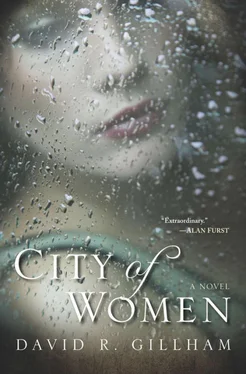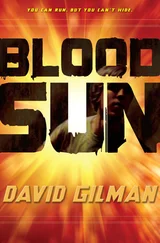Passengers on the bus are lumped together like potato sacks. A few aging men with their newspapers, though mostly the city has been left to its women. Under the new conscription decrees, regiments of husbands, uncles, and brothers have been mobilized and Berlin has become a city of women. They fill the bus, as always, concentrating on their knitting or clutching their heavy handbags in their laps, while the advertising placards extol the virtues of the Ski-Nelly brassiere with extra wide straps, and Erdal shoe polish. But last night’s return of the bombers has had its effect. There is an undercoating of tension hidden by the masks of business as usual slapped on people’s faces. The newspaper headlines are high-strung and victimized. AIR ATTACK ON BERLIN WORKING-CLASS DISTRICT and AIMLESS BOMBING OVER BERLIN RESIDENTIAL AREAS the morning editions cry. The Morgenpost claims to know WHAT CHURCHILL INTENDS TO BOMB IN BERLIN.
She writes a few words to Kaspar on the special stationery issued by the Feldpost, using her purse as a desktop and her father’s Montblanc fountain pen. She has grown rather proficient at this, learning how to anticipate the agitation of the bus ride and lift the nib of the pen to keep from creating a blot. She does not mention the bombing, because she knows the censors would scratch it out in any case. So all she writes is that she and his mother remain healthy and well, and that she is quite busy at the office. All is in order. What else can she say? Recapping her pen, she folds the letter away, and leans back her head, closing her eyes.
Do you feel that?
Yes.
Then you know what it’s for.
At the Ku’damm she transfers from the bus to the underground. The U1 on the B line. The U-Bahn train that traverses the city’s belly from the Uhlandstrasse, past the Schlesisches Tor and across the River Spree to the station at the Warschauer Brücke. It’s usually a quick enough ride for her, five stops to Hallesches Tor. But then, at Anhalter Bahnhof, something happens. The usual crowd pushes on from the commuter trains, and the doors have been closed to the platform, but the train does not move. Nobody talks. Why bother? Delays happen. It’s all part of the war. Then the door to the carriage is rolled open, and two men shove their way in. Snap-brim hats and long overcoats. They come to a halt in front of a woman in a threadbare outfit and a kerchief over her tousled brown hair. Her face is colorless and gaunt, she stands hanging from a handrail. “Papers,” one of the men demands. The timber of his voice cuts through dreary silence. It is an official voice. A voice of authority. “Papers. Show me your papers.”
The woman’s posture goes rigid. She glares for a heartbeat and then spits solidly into the man’s face. “ Shit! ” he swears, smearing the spittle from his eye. “You ugly bitch!” The crack of his hand, as he slaps her face, galvanizes the attention of the carriage. A middle-aged hausfrau across the car leaps to her feet, but then she freezes.
“Geheime Staatspolizei,” the man in the leather trench coat assures everyone, displaying his aluminum warrant disc for all to peruse. He is fat. Fatter than any Berliner living on a lawful share of war rations should be. “This creature is a Jewish parasite, and is of no concern to any good German,” the fat man declares. “She has boarded public transportation in violation of the law, and has appeared in public without the Judenstern that she is legally required to wear .” The Judenstern. A cloth badge in the shape of a yellow star with six points, and the word “Jude” machine-stitched at the center in mock Hebraic lettering.
The carriage remains silent. The standing hausfrau suddenly looks hunted and slouches back down into her seat. Most eyes turn to the carriage floor. The fat man appears satisfied with this. He nods to his partner, who shoves the woman in the kerchief out of the car, and then rolls the door closed behind them.
No one speaks until the train begins to lumber out of the station, when the hausfrau, now clutching her handbag, tries to redeem herself as a good German by blustering, “Dirty Jewess, delaying the train. Now we’ll all be late.”
Eyes dart back and forth, but the only replies are a few loud coughs and the rattle of newspapers.
———
Two days after the coupling in the back row of the cinema, he took her to a room at the top of a dingy flight of steps. Inside, he dropped his trousers in front of her, while she was still only half out of her coat. She froze up at the sight, one arm out of her sleeve, her eyes dropping to his exposure.
“Take a good look,” he instructed her, “before we go any further. You know what this means.”
Still staring. Somehow it answered the questions that had been building. His covertness. All the hidden thought she detected behind his eyes. But all she said was, “It means you’re missing a small flap of skin.”
“It means more than that, and you know it. This is exactly what all the race laws have been written to prevent. “
She did not budge a muscle as she lifted her eyes to his face “I don’t care.”
“No? You are so eager to become a blood traitor to your race?”
“I already have become.”
“That was in the dark. This is in the light. You know what happens if we are found out. An Aryan female fornicating with a Jew , much less a criminal Jew who doesn’t wear the Judenstern? It could mean prison for you, if you’re lucky . If you’re not, they’ll drop you into a camp, where you’ll be breaking up rusted batteries with a wooden mallet.”
A small breath inhaled and then exhaled. She had seen the newsreels of labor camps, for the work-shy, for politicals and habitual criminals. They weren’t exactly a secret. For an instant she tried to imagine such a fate. Tried to imagine herself in a rough barracks, smashing those batteries. A prisoner in a striped smock. A race criminal. But the heat she felt rise up in her simply scorched the image from her mind. “Then we must not be found out,” she answered, and dropped her coat onto the floor.
BUILDINGS ALONG THE BROAD AVENUE of Unter den Linden are veiled by acres of camouflage netting festooned with artificial branches to fool Tommy into thinking he’s flying over the Spreewald instead of the middle of the city. But the area around the Hallesches Tor is much like it has always been. It’s a glum working-class slice of Kreuzberg known for its rowdy beer halls. Not a place she’d ever walk at night, but during the day it’s not so bad. Off-duty soldiers loiter about the U-Bahn station, smoking and calling to the girls. Berliners troop off to work across the Belle Alliance Brücke, which bridges the Landwehrkanal’s slow, murky green current. The U1 exits its underground tunnel and rumbles up a long stretch of elevated track toward Rummelsburg, throwing off sparks from its wheels. Only the tangy smell of smoke betrays the recent visit by the RAF bombers. A smell that will linger for days.
She enters the patent office building through the Alexandrinenstrasse door. On the wall there is a dark bronze memorial plaque listing the names of all those patent officials killed in the last war. Across the hall, one of the building porters is tacking up a poster. A leering green face with a hooked beak and drooping, malevolent eyes wears the six-pointed star on his lapel like a boutonniere. This is the enemy of our blood! the caption decries. Show him no mercy! She gazes at the poster blankly, then joins the queue to have her identity card checked by the aging policeman at the desk.
• • •
THE STENOGRAPHIC DEPARTMENT is a drab and cavernous affair of flat gray paint and hardwood floors worn smooth. Footsteps can boom into the high ceilings like cannon fire. A photograph of the Führer is hung without irony beside the official air raid alarm instructions. Stay calm. Obey the warden. Keep gas masks ready.
Читать дальше












